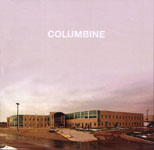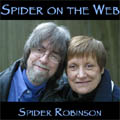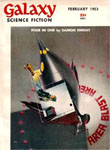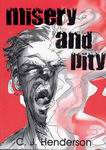
I didn’t expect to be reviewing this audiobook. Prior to its arrival in the SFFaudio mailbox I didn’t even know this audiobook existed. It is neither Science Fiction, nor Fantasy. Its Horror is of the very detached and remote kind because of the way it is told. I scoured the packaging looking for a sign as to why we were sent this audiobook. The only thing that stood out was that it was directed by Emily Janice Card (that’s Orson Scott Card‘s audiobook producing daughter). That’s a very tenuous connection to what is normally our kind of audiobook. But, after listening to the book in its entirety I found I had some things to say about it. And… we do have this handy “Aural Noir” tag that I use to talk about the Mystery, Thriller, and Noir audiobooks that I so love. Why not review it under its aegis?
Done!
 Columbine
Columbine
By Dave Cullen; Read by Don Leslie
11 CDs – Approx. 13 Hours [UNABRIDGED]
Publisher: Blackstone Audiobooks
Published: March 2009
ISBN: 9781433290435
Themes: / Crime / History / Colorado / Murder / Suicide / Psychopathy /
“If you want to understand ‘the killers,’ quit asking what drove them. Eric Harris and Dylan Klebold were radically different. Klebold is easier to comprehend, a more familiar type. He was hotheaded, but depressive and suicidal. He blamed himself for his problems. Harris is the challenge. He was sweet-faced and well-spoken. Adults, and even some other kids, described him as ‘nice.’ But Harris was cold, calculating, and homicidal. ‘Klebold was hurting inside while Harris wanted to hurt people.'”
Journalist Dave Cullen has assembled what must be, for the foreseeable future, the definitive book about the 1999 Columbine High School massacre. Myself, I was only vaguely familiar with the incident at the time. In 2002 I watched Michael Moore’s disturbing film Bowling For Columbine. It was a kind of editorial-documentary on the event itself, the connections with other shootings and firearms in general. Since then, the Columbine High School massacre had been completely off my radar. Dave Cullen’s non-fiction book Columbine supports my conviction that if you really want to know what exactly happened, you’ll have to wait for the facts to be ferreted out by a historian. Cullen is just such a historian. The history Cullen paints is rich in factual details. His sources are: the writings and videos of Eric Harris and Dylan Klebold themselves, county records, friends of the murderers, their fellow students, eyewitness interviews, police records, victims, victim’s families and probably most crucially a senior FBI agent. That agent, Dwayne Fuselier, had a son attending Columbine High School on the day – so his arrival on the scene was both personal and professional – his later investigations reveal insights into the vast reams of documents and video produced by the killers themselves. With Fuselier’s assistance Cullen debunks virtually all of the many myths and falsehoods that swirled around the media’s coverage of the massacre.
Other than the two murderers, and the gun suppliers, the only other major villain in Cullen’s account of the massacre and its aftermath is the Jefferson County Sheriff’s Office. “Jeffco” was in charge of the investigation. It was also responsible for a lot of the incompetence that lead to it being necessary. In the aftermath Jeffco had a limelight loving sheriff who was concocting conspiracy theories that he had no investigative evidence for. But that bunk seems to have supressed some very interesting facts. For instance. Were you told the police had, prior to the attack, documented murder threats by Harris/Klebold prior to the attack? Did you know that the police had even made out a search warrant based on these threats? Did you know that, if the warrant had been taken to a judge, it would have allowed the police to discover the weapons cache the teens were preparing? Did you know that Eric Harris and Dylan Klebold been arrested together, for another crime, prior to the attack?
Other myths Cullen debunks are those generated by the media and church groups. Had you heard about the girl who said ‘yes’ when asked if she ‘believed in God’? Ya, I had too. Did you know that she actually didn’t say it? That another teen had, and that she wasn’t shot? That instead this survivor, the one who had actually proclaimed her belief, was branded a liar by the evangelical community? I hadn’t known that.
With Columbine Cullen, has assembled a first rate piece of non-fiction history. It illustrates exactly why a public reaction to the daily news so often leads to dangerously false beliefs. If there was just one takeaway from this audiobook let it be that American society needs to be more focused on the problem of detecting psychopathy. Not all psychopaths are murderous, in fact most are law abiding. What unites them all is that other people don’t matter to them, except as a means to their ends.
Blackstone has issued the same stark cover for the audiobook as is on the paperbook. Chapters jump back and forth in time, showing the consequences of and the preparations for the murderous assault. This is a wise structural move as the day’s events themselves are not the primary focus of this book. In fact a good deal of the narrative follows others who were there that day: Frank DeAngelo, the Columbine High School principal, some of surviving victims and their families or the workings of the media itself. Don Leslie, the narrator, is given the grim task of reading the words of Klebold and Harris. It isn’t an enviable job, but he is up to the task. There is a disclaimer at the beginning of the audiobook that explains that all the words in quotes are sourced from interviews, transcripts and articles. This is naturally less clear in the audiobook version than the paperbook edition but Leslie does his best to make each quote as clear as he can.
Posted by Jesse Willis

 Spider Robinson‘s latest podcast features what he calls a “a suicide prevention kit” of an episode. The kit‘s contents includes more of Spider’s favorite music, and TWO unabridged readings of short Science Fiction stories about suicide from the pen of Theodore Sturgeon! The first of the two is A Saucer Of Loneliness. It was first published in Galaxy Magazine’s February 1953 issue. It was adapted into a radio drama for X-Minus One in 1957. Was again adapted, for television this time, into a segment of one episode of The Twilight Zone in 1986. Finally in 2004 it received a ‘Retro Hugo’ award. A well deserved honor for this very solid story. The second, Suicide, was first published in 1970 in Adam Bedside Reader (this same issue included Harlan Ellison’s Wanted In Surgery).
Spider Robinson‘s latest podcast features what he calls a “a suicide prevention kit” of an episode. The kit‘s contents includes more of Spider’s favorite music, and TWO unabridged readings of short Science Fiction stories about suicide from the pen of Theodore Sturgeon! The first of the two is A Saucer Of Loneliness. It was first published in Galaxy Magazine’s February 1953 issue. It was adapted into a radio drama for X-Minus One in 1957. Was again adapted, for television this time, into a segment of one episode of The Twilight Zone in 1986. Finally in 2004 it received a ‘Retro Hugo’ award. A well deserved honor for this very solid story. The second, Suicide, was first published in 1970 in Adam Bedside Reader (this same issue included Harlan Ellison’s Wanted In Surgery).
![AdamBedsideReader431970150 Adam Bedside Reader - June 1970 [Number 43]](https://www.sffaudio.com/images09/AdamBedsideReader431970150.jpg) “A Saucer of Loneliness” and “Suicide”
“A Saucer of Loneliness” and “Suicide”


